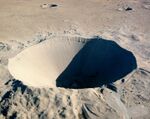Difference between revisions of "User:Scrater"
| (8 intermediate revisions by the same user not shown) | |||
| Line 1: | Line 1: | ||
==About Me== | ==About Me== | ||
| − | I am currently an undergraduate student in the [[Wikipedia: Pratt School of Engineering | Pratt School of Engineering]] at [[Wikipedia: Duke University | Duke University]]. I graduated from [[Wikipedia: Chatham High School (New Jersey) | Chatham High School]] in Chatham, NJ in 2017. | + | I am currently an undergraduate student in the [[Wikipedia: Pratt School of Engineering | Pratt School of Engineering]] at [[Wikipedia: Duke University | Duke University]]. I graduated from [[Wikipedia: Chatham High School (New Jersey) | Chatham High School]] in Chatham, NJ in 2017. As of right now, I plan to study Biomedical Engineering and Computer Science at Duke. |
| − | [[File:Upload.wikimedia.org-wikipedia-commons-b-b6-Sedan_Plowshare_Crater.jpg|thumb|upright=0.50|| A lovely example of a ''[[Wikipedia: | + | ==Name Pronunciation== |
| − | + | [[File:Upload.wikimedia.org-wikipedia-commons-b-b6-Sedan_Plowshare_Crater.jpg|thumb|upright=0.50|| A lovely example of a ''[[Wikipedia: Impact_crater | Crater]]''.]] | |
My name (Stephanie) is pronounced "Steh-FUH-Nee" (exactly like you would expected to be pronounced). If that's too hard, you can always call me Steph. My last name (Crater) is pronounced "CRAY-ter", like the large bowl-shaped cavities on the surface of a planet or moon typically caused by an explosion or the impact of an asteroid or other celestial body. | My name (Stephanie) is pronounced "Steh-FUH-Nee" (exactly like you would expected to be pronounced). If that's too hard, you can always call me Steph. My last name (Crater) is pronounced "CRAY-ter", like the large bowl-shaped cavities on the surface of a planet or moon typically caused by an explosion or the impact of an asteroid or other celestial body. | ||
| − | |||
| − | |||
==Interests== | ==Interests== | ||
I love swimming, animals (especially dogs), being outdoors, and, of course, engineering! | I love swimming, animals (especially dogs), being outdoors, and, of course, engineering! | ||
| + | ==Favorite MATLAB Demonstration== | ||
| + | My favorite demo was "Loma Prieta Earthquake" because it was really interesting to see how MATLAB can be used to manipulate real-world data and generate meaningful graphs in three dimensions. | ||
==Grand Challenges Article== | ==Grand Challenges Article== | ||
[https://www.psychologytoday.com/blog/consciousness-self-organization-and-neuroscience/201705/reverse-engineering-the-brain Reverse Engineering the Brain], Joel Frohlich, Psychology Today, 9 May 2017, accessed 15 September 2017 (Reverse-Engineer the Brain) | [https://www.psychologytoday.com/blog/consciousness-self-organization-and-neuroscience/201705/reverse-engineering-the-brain Reverse Engineering the Brain], Joel Frohlich, Psychology Today, 9 May 2017, accessed 15 September 2017 (Reverse-Engineer the Brain) | ||
Latest revision as of 05:16, 22 September 2017
Contents
About Me
I am currently an undergraduate student in the Pratt School of Engineering at Duke University. I graduated from Chatham High School in Chatham, NJ in 2017. As of right now, I plan to study Biomedical Engineering and Computer Science at Duke.
Name Pronunciation

My name (Stephanie) is pronounced "Steh-FUH-Nee" (exactly like you would expected to be pronounced). If that's too hard, you can always call me Steph. My last name (Crater) is pronounced "CRAY-ter", like the large bowl-shaped cavities on the surface of a planet or moon typically caused by an explosion or the impact of an asteroid or other celestial body.
Interests
I love swimming, animals (especially dogs), being outdoors, and, of course, engineering!
Favorite MATLAB Demonstration
My favorite demo was "Loma Prieta Earthquake" because it was really interesting to see how MATLAB can be used to manipulate real-world data and generate meaningful graphs in three dimensions.
Grand Challenges Article
Reverse Engineering the Brain, Joel Frohlich, Psychology Today, 9 May 2017, accessed 15 September 2017 (Reverse-Engineer the Brain)